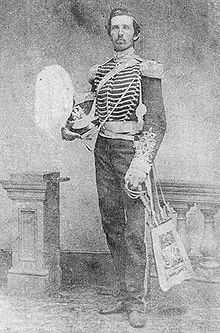George Taylor Denison III

Lieutenant-Colonel George Taylor Denison III, FRSC (31 August 1839 – 6 June 1925) was a Canadian soldier and publicist.
He was born in Toronto to Colonel George Taylor Denison II, and educated at Upper Canada College. In 1861 he was called to the bar, and was from 1865-1867 a member of the city council. From the first he took a prominent part in the organization of the military forces of Canada, becoming a lieutenant-colonel in the active militia in 1866. He saw active service during the Fenian raids of 1866, and during the North-West Rebellion of 1885.
Owing to his dissatisfaction with the conduct of the Conservative ministry during the Red River Rebellion in 1869-70, he abandoned that party, and in 1872 unsuccessfully contested Algoma in the Liberal interest. Thereafter he remained free from party ties. In 1877 he was appointed police magistrate of Toronto.
Colonel Denison was one of the founders of the Canada First movement, which did much to shape the national aspirations from 1870 to 1878, and was a consistent supporter of imperial federation and of preferential trade between Great Britain and her colonies. He became a member of the Royal Society of Canada, and was president of the section dealing with English history and literature. The best known of his military works is his History of Modern Cavalry (London, 1877), which was awarded the Czar of Russia Prize in an open competition in 1879, and has been translated into German, Russian and Japanese. It remains one of the definitive works on the subject.[1] In 1900 he published his reminiscences under the title of Soldiering in Canada.
He was a public defender of Upper Canada College, and was also known for virulent Anti-Americanism; after a proposal was made to erect a statue of George Washington in Westminster Abbey, he threatened that if it were built, he would go there to spit on it. Following the attempts by the Fenian raiders to "liberate" Canada between 1866 and 1871, Denison claimed a Yankee sword from the battlefield for a poker on his fire.[1]
Denison died in Toronto in 1925 and buried at a family plot in St. John's Cemetery on the Humber in Weston, Ontario.
Denison Family
- Captain John Denison (November 20 1755 in Hedon, Yorkshire England-October 28 1824 in York, Upper Canada) - great-grandfather of Denison III
- George Taylor Denison I, grandfather of Denison III and British militia soldier in the War of 1812
- Captain Thomas John Denison (November 1 1786 in Dovercourt, England-August 23, 1846 in York, Upper Canada), great-grand-uncle of Denison III
- Charles Denison (1789 in Dovercourt, England-1828 in York, Upper Canada)
- John Denison (1796-1826), great-grand-uncle of Denison III
- Elizabeth Denison (1800-1801), great-grand-aunt of Denison III
- Elizabeth Sophia Denison (1803-1892), great-grand-aunt of Denison III
- George Taylor Denison II (1816-1873), father of Denison III and Canadian militia commander (Denison's Horse)
- Lieutenant-Colonel Frederick Charles Denison CMG (1846-1896), brother of George and Canadian Member of Parliament (Conservative)
- Commodore John Denison, DSO, brother of George, Royal Navy Admiral and aide-de-camp to Edward VII of the United Kingdom
- Septimus Junius Denison, brother of George, British Army General, and Boer War veteran
- George Taylor Denison II (1816-1873), father of Denison III and Canadian militia commander (Denison's Horse)
Source: Toronto Star[2] and [3]
References
- ↑ 1.0 1.1 Killbourn, William; Toronto Remembered; Soddart Publishing, Toronto; 1984; Pg. 168
- ↑ George T Denison Judge of Character
- ↑ Denison Family of Toronto
- "George Taylor Denison III". Dictionary of Canadian Biography (online ed.). University of Toronto Press. 1979–2005.
 This article incorporates text from a publication now in the public domain: Chisholm, Hugh, ed. (1911). Encyclopædia Britannica (11th ed.). Cambridge University Press.
This article incorporates text from a publication now in the public domain: Chisholm, Hugh, ed. (1911). Encyclopædia Britannica (11th ed.). Cambridge University Press.
| Professional and academic associations | ||
|---|---|---|
| Preceded by James Alexander Grant |
President of the Royal Society of Canada 1903–1904 |
Succeeded by Benjamin Sulte |